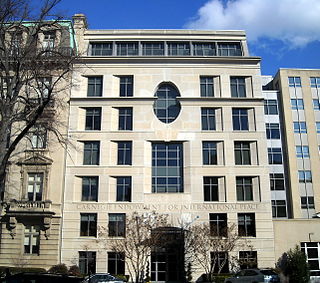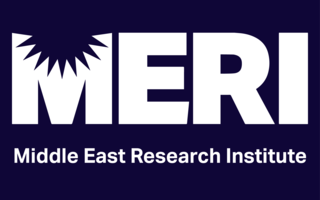Related Research Articles

A think tank, or public policy institute, is a research institute that performs research and advocacy concerning topics such as social policy, political strategy, economics, military, technology, and culture. Most think tanks are non-governmental organizations, but some are semi-autonomous agencies within a government, and some are associated with particular political parties, businesses, or the military. Think tanks are often funded by individual donations, with many also accepting government grants.

The Carnegie Endowment for International Peace (CEIP) is a nonpartisan international affairs think tank headquartered in Washington, D.C., with operations in Europe, South Asia, East Asia, and the Middle East, as well as the United States. Founded in 1910 by Andrew Carnegie, the organization describes itself as being dedicated to advancing cooperation between countries, reducing global conflict, and promoting active international engagement between the United States and countries around the world. It engages leaders from multiple sectors and across the political spectrum.
The Journal of Palestine Studies (JPS) is a quarterly peer-reviewed academic journal which has been published since 1971. It is published by Taylor and Francis on behalf of the Institute for Palestine Studies.

The European Council on Foreign Relations (ECFR) is a pan-European think tank with offices in seven European capitals. Launched in October 2007, it conducts research on European foreign and security policy and provides a meeting space for decision-makers, activists and influencers to share ideas. ECFR builds coalitions for change at the European level and promotes informed debate about Europe's role in the world. ECFR has offices in Berlin, London, Madrid, Paris, Rome, Warsaw and Sofia.
The Center for the National Interest is a Washington, D.C.–based public policy think tank. It was established by former U.S. President Richard Nixon on January 20, 1994, as the Nixon Center for Peace and Freedom.
The Think Tanks and Civil Societies Program (TTCSP) was a non-profit program at the University of Pennsylvania in Philadelphia, Pennsylvania, that operated from 1989 to 2021. TTCSP was originally established at the Foreign Policy Research Institute in 1989. The director was James McGann. The program conducted research on policy institutes around the world, and maintained a database of over 8,200 think tanks from across the world.
LSE IDEAS is a foreign policy think tank at the London School of Economics and Political Science. IDEAS was founded as a think tank for Diplomacy and Strategy in February 2008, succeeding the Cold War Studies Centre founded in 2004. It is led by Professor Christopher Alden and Professor Michael Cox. LSE IDEAS has been ranked as the top European university-affiliated think tank and the number two university-affiliated think tank in the world.

James G. McGann (1955–2021) was an American academic who was a Senior Lecturer in International Studies, Founder and Director of the Think Tanks and Civil Societies Program at the Lauder Institute at the University of Pennsylvania and a senior fellow at the Foreign Policy Research Institute, both in Philadelphia.
The Diplomatic Courier is an English-language global news and international affairs analysis magazine based in Washington, D.C. It publishes six print issues per year. Its focus is on developments in diplomacy, conflict resolution, international affairs, and rule of law, as well as concepts and theories from a wide variety of related disciplines.

The Institute for National Security Studies (INSS) is an independent think tank affiliated with Tel Aviv University in Israel that conducts research and analysis of national security matters such as military and strategic affairs, terrorism and low intensity conflict, military balance in the Middle East, and cyber warfare.

The King Abdullah Petroleum Studies and Research Center (KAPSARC) is an advisory organization specializing in energy economics, climate, and sustainability that seeks to advance Saudi Arabia’s energy sector and inform global policies through evidence-based advice and applied research. It is located in Riyadh, Saudi Arabia.
The Oxford Institute for Energy Studies, founded in 1982, is an independent energy research institute, based in Oxford.
The East Asia Institute (Korean: 동아시아연구원) is a non-profit independent, private think tank founded in 2002 with the stated mission of establishing a regional community based on democracy and a market economy. The chairman is Young-Sun Ha, an honorary professor from Seoul National University, and the president is Yonsei University professor Yul Sohn. The organisation is based in Seoul, South Korea. The institute's work focuses on interdisciplinary research in the social science fields. It is a member of the Council of Councils. It has created an archival website of publications related to North Korea.

The Middle East Research Institute (MERI) is an academic policy-research institute and think tank based in Erbil in the Kurdistan Region of Iraq. MERI carries out fundamental research in areas of peace, human rights, governance, security and economy. Founded in 2014, the organisation has grown rapidly and now occupies an important niche in the field of policy research in the Middle East. MERI has been ranked by Think Tanks and Civil Societies Program of University of Pennsylvania as Iraq's leading policy research organisation for the past three years in a run and No. 34 in the Middle East and North Africa.
Ghadir Shafie is a Palestinian activist and feminist. She is the co-director of Aswat, an organization of queer Palestinian women, which she joined in 2008.

Dr. Ebtesam Al-Ketbi is a political scientist who founded and presides over The Emirates Policy Center think tank.
The Centre for European Reform (CER) is a London-based think tank that focuses on matters of European integration. In 2021 it was ranking 58th among the top think tanks worldwide (non-US) in the Global Go To Think Tank Index Report published by the Think Tanks and Civil Societies Program.
Sa'ed Atshan is a Palestinian anthropologist and professor at Swarthmore College.
The Council for Foreign and Defense Policy is a Russian Think Tank. It was formed on February 25, 1992. It has been called the "leading public foreign policy organization" for Russia.
References
- ↑ "Middle East Policy Network form 990 2015". ProPublica. Retrieved 22 September 2017.
- ↑ "Al-Shabaka, About".
- ↑ "Palestine's first independent think tank launched". The Electronic Intifada. 19 April 2010. Retrieved 17 May 2017.
- ↑ "Al-Shabaka Annual Report 2015" (PDF). Archived from the original (PDF) on 13 July 2022.
- ↑ Hussein, Cherine (March 2015). The Re-Emergence of the Single State Solution in Palestine/Israel: Countering an Illusion. London, Routledge.
{{cite book}}: CS1 maint: location missing publisher (link) - ↑ Azzam, Zeina (18 March 2015). "The Challenges Posed by the Vacuum in Palestinian Political Leadership". The Jerusalem Fund. Retrieved 17 May 2017.
- ↑ "International Organisations". British Society for Middle Eastern Studies. Archived from the original on 16 June 2017. Retrieved 17 May 2017.
- ↑ Atshan, Sa'ed (2021-10-01). "The Anthropological Rise of Palestine". Journal of Palestine Studies. 50 (4): 3–31. doi:10.1080/0377919X.2021.1969806. ISSN 0377-919X. S2CID 244661676.
- ↑ McGann, James (26 January 2017). "2016 Global Go To ink Tank Index Report". University of Pennsylvania Scholarly Commons. Retrieved 17 May 2017.
- ↑ McGann, James (2021-01-28). "2020 Global Go To Think Tank Index Report". TTCSP Global Go to Think Tank Index Reports.